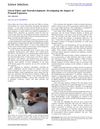 1 citations,
January 2022 in “Stem cell biology and regenerative medicine”
1 citations,
January 2022 in “Stem cell biology and regenerative medicine” New methods to test hair growth treatments have been developed.
1 citations,
January 2012 in “International journal of trichology” Sheep hair follicle cells can grow a lot but need the dermal papilla to do so.
1 citations,
August 2005 in “Springer eBooks” Alopecia areata is an autoimmune disease with genetic links, treatable with certain medications, and can affect mental health.
Current hair regeneration methods show promise but face challenges in maintaining cell effectiveness and creating the right environment for hair growth.
November 2024 in “Biochemical and Biophysical Research Communications” Abnormal gene expression related to keratin causes hair loss in certain mice.
 August 2024 in “Current Protocols”
August 2024 in “Current Protocols” The C3H/HeJ mouse model is useful for studying and testing treatments for alopecia areata.
July 2024 in “Anais Brasileiros de Dermatologia” PRP injections can increase hair density in people with androgenic alopecia.
 July 2024 in “Clinical Cosmetic and Investigational Dermatology”
July 2024 in “Clinical Cosmetic and Investigational Dermatology” Exosomes can help promote hair growth and may treat hair loss.
 April 2024 in “Communications biology”
April 2024 in “Communications biology” Enzymes involved in Vitamin A metabolism affect hair growth and type in mice.
March 2024 in “Veterinary sciences” Geriatric Julia Creek dunnarts often suffer from reproductive and skin diseases, impacting conservation efforts.
 February 2024 in “International Journal of Molecular Sciences”
February 2024 in “International Journal of Molecular Sciences” Hair loss in Androgenetic Alopecia is caused by genetics, aging, and lifestyle, leading to hair follicle shrinkage and related health risks.
January 2024 in “Animals” SP1 promotes and KROX20 inhibits hair cell growth by affecting the CUX1 gene.
 December 2023 in “Aggregate”
December 2023 in “Aggregate” Scientists are using clumps of special stem cells to improve organ repair.
Transplanted rat hair follicles grew hair and had increased but not fully restored nerve connections in mice.
Researchers made a mouse model with curly hair and hair loss by editing a gene.
 April 2023 in “Dermatologica Sinica”
April 2023 in “Dermatologica Sinica” Sex hormones affect hair growth and loss, and treatments for related hair diseases include various medications, hair transplantation, and light therapy.
January 2022 in “Springer eBooks” Fibroblast growth factors are crucial for hair follicle development and regeneration.
June 2020 in “Comparative medicine” NSG mice had the most mites, and genetic factors affect immune response and susceptibility.
 July 2019 in “Journal of Investigative Dermatology”
July 2019 in “Journal of Investigative Dermatology” The research found that male pattern hair loss is mostly genetic and involves hair thinning due to hormonal effects and changes in gene expression.
Melatonin increased the activity of a hair growth gene in Cashmere goats.
 May 2009 in “Hair transplant forum international”
May 2009 in “Hair transplant forum international” Androgens affect hair growth and shedding, with genetic and non-genetic factors influencing baldness.
November 2022 in “Regenerative Therapy” Advancements in tissue engineering show promise for hair follicle regeneration to treat hair loss.
 December 2015 in “Journal of skin and stem cell”
December 2015 in “Journal of skin and stem cell” Using a gel called Diclofenac can potentially cause hair to grow back in bald spots in older men.
January 2015 in “American journal of medical and biological research”  November 2023 in “Annales de dermatologie et de vénéréologie, FMC”
November 2023 in “Annales de dermatologie et de vénéréologie, FMC” Baricitinib effectively treats severe alopecia for up to 104 weeks.
 3 citations,
June 2017 in “Environmental health perspectives”
3 citations,
June 2017 in “Environmental health perspectives” Exposure to certain glycol ethers during pregnancy may be linked to lower verbal comprehension in children.
 11 citations,
May 2011 in “Journal of Cutaneous Medicine and Surgery”
11 citations,
May 2011 in “Journal of Cutaneous Medicine and Surgery” Break dancing on the head may cause a type of scarring hair loss that needs early treatment to prevent permanent damage.
 3 citations,
January 2015 in “Nasza Dermatologia Online”
3 citations,
January 2015 in “Nasza Dermatologia Online” Some treatments for autoimmune hair loss work, but JAK inhibitors like tofacitinib are promising for regrowth.
 39 citations,
July 2008 in “Dermatologic Therapy”
39 citations,
July 2008 in “Dermatologic Therapy” Pseudopelade of Brocq is a unique hair loss condition, but its cause and development are still not fully understood.
 27 citations,
September 2018 in “Skin appendage disorders”
27 citations,
September 2018 in “Skin appendage disorders” Hair transplantation may work for some types of scarring alopecia, but results vary and more research is needed.
















